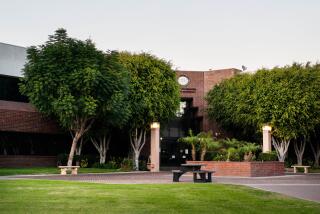Opening a Door : University Donor Sees His Success as an Example for Young Blacks
- Share via
Earl C. Broady grew up in a segregated Los Angeles. In the early part of this century, he vividly recalls, blacks were turned away at theaters and “you couldn’t sit down in a restaurant anywhere” in a white neighborhood.
“I don’t want to appear bitter,” he said recently, but it was a tough time for a black--and a poor one at that--to scratch out a living, much less even dream of becoming prosperous.
But Broady made it--as a cop, a lawyer, a Superior Court judge and a successful real estate investor.
Now, he wants other blacks to, in effect, use him as a role model. “It might give somebody hope,” he said.
Earlier this year, in an effort to open some doors to promising black students, Broady donated $1 million to predominantly black Howard University to establish an endowed chair in the law school in the name of him and his wife, Anna, a former teacher.
Interest from the endowment’s trust fund--expected to amount to about $100,000 annually--will allow the Washington university to attract new teaching talent.
A Howard spokesman, Alan Hermesch, said Broady’s gift was a “very significant” one to a university which has total endowments of about $25 to $30 million. The school, he said, “needs the support of such people as Judge Broady to build its faculty and the capability of its research and performance in the academic arena.”
Broady agrees. “It’ll add a lot to Howard,” the 81-year-old retired judge said, with a touch of pride, in an interview at his Beverly Hills home. “I felt some sense of duty to Howard.”
The sense of duty comes from his relationship with the late Curtis C. Taylor, a 1926 Howard law school graduate whom Broady credits for much of his success.
Broady was a mail carrier in the 1920s in Los Angeles when he met Taylor, a lawyer who also published a weekly newspaper and was to become Broady’s mentor. It was Taylor who inspired him to pursue the study of law, despite the obstacles in his way.
Becoming a lawyer was a quantum leap for Broady, the youngest of four boys born to an elementary school janitor in a poor neighborhood near downtown Los Angeles.
Making ends meet preoccupied Broady’s early years. Relaxing in his den with his wife nearby, he recalled with a smile the halcyon days of “Broady’s Foot Warmers,” a combo he led about 60 years ago in which he played jazz piano and “made $4 to $5 a night, which helped feed the kids.” His children, Earl Jr. and Elaine Pope, are now practicing attorneys in Los Angeles, he said.
In 1929, Broady joined the Los Angeles Police Department as a traffic cop, moving up to homicide detective after a decade. After a stint at USC studying business administration, Broady began taking law classes at Los Angeles College of Law, but he abandoned his studies after 18 months because of conflicts between his night school schedule and his police duties.
It was prodding by Taylor and another lawyer, Lloyd C. Griffiths, that pushed Broady back into the study of law. He never returned to law school, but under Taylor’s tutelage, Broady began studying for the bar exam. Although “scared to death,” he took and passed the bar on his second attempt and was admitted to practice in 1944--rare for someone without a law school degree, but still possible today in California.
Appointed by Pat Brown
His legal career was to run the gamut from being retained by Malcolm X to defend 14 Black Muslims in a case against the Los Angeles Police Department, to an appointment to the commission which investigated the Watts riot, to being named a judge in 1965 by Gov. Edmund G. (Pat) Brown.
The Howard University chair obviously means a lot to Broady. It is a chance to provide a mentor to other young blacks who might be on the verge of giving up.
“Black youths don’t always take advantage of opportunities,” he said. “They need to be willing to open up the books, to be willing to work and study. It reduces the odds of failure.”
More to Read
Sign up for Essential California
The most important California stories and recommendations in your inbox every morning.
You may occasionally receive promotional content from the Los Angeles Times.













